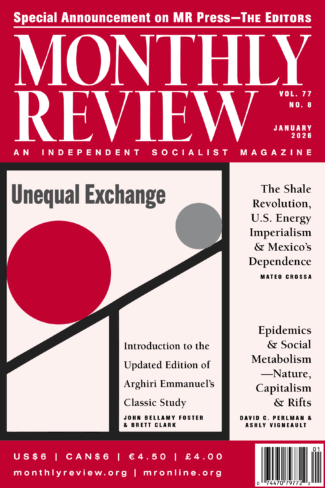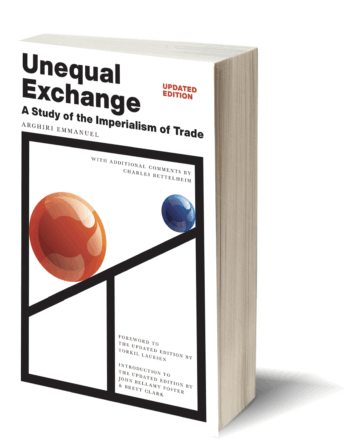Article Subjects and Geography: Marxism
January 2026 (Volume 77, Number 8)
January 1, 2026
This month's "Notes from the Editors" celebrates the accomplishments of Michael Yates, who is retiring as editorial director of Monthly Review Press. Michael's books and articles have had a tremendous impact on the work of Monthly Review as a whole, and will be sorely missed. The editors also welcome the new editorial director of the Press, Arun Kundnani, an accomplished scholar who promises to carry on the MR tradition while bringing a fresh perspective to our collective efforts.Introduction to the Updated Edition of Arghiri Emmanuel’s ‘Unequal Exchange’
January 1, 2026
In this Introduction to the updated edition of Unequal Exchange by Arghiri Emmanuel, published by Monthly Review Press, John Bellamy Foster and Brett Clark offer readers insight into the continuing influence of Emmanuel's seminal work. Through both deep understanding thoughtful critique, the authors deftly situate Emmanuel's text as an indispensable part of an enduring tradition of Marxist analysis of the global dynamics of labor.December 2025 (Volume 77, Number 7)
December 1, 2025
As part of our special issue on the legacy of former MR coeditor Robert W. McChesney, December's "Notes from the Editors" revisits his prescient insight into the rise of neofascism in the U.S. While the threat is undeniable, he wrote, "the good news…is that there is nothing inexorable about the victory of fascism. There is another road out, and that road is socialism."Bob McChesney: A Life Well Lived
December 1, 2025
In this deeply personal essay, communication scholar Inger Stole shares with readers a glimpse into her life with Robert W. McChesney, her husband of 37 years. Stole reveals the depth of feeling with which McChesney approached all aspects of life, from his work as an intellectual and advocate to his role as a father and life partner.Be Realistic, Demand the Impossible
December 1, 2025
Mandy Tröger and Sydney L. Forde explore the impact that Robert W. McChesney's work has had on both the communication field and on their work as the new generation of scholars. "To honor [McChesney]," they write, "is not to look up in awe, but look out…toward the unfinished work of building a more democratic field and society."Reinventing Local Journalism: Carrying Forward Bob McChesney’s Unfinished Project
December 1, 2025
Victor Pickard celebrates the passion and clarity that Robert W. McChesney brought to his work as an author, media advocate, and founder of Free Press—and in particular, McChesney's bold proposals for a publicly funded and democratic model of local journalism designed to serve communities, rather than corporate interests.Fiftieth Anniversary Retrospective on Pomfret (Class of 1971)
December 1, 2025
Writing upon the fiftieth anniversary of his graduation from Pomfret School in Connecticut, Robert W. Chesney shares in his own words the story of his intellectual development, from his teen years through his studies at The Evergreen State College, and how they shaped his career as a journalist and activist—including his role as coeditor of MR.Tributes to Robert W. McChesney
December 1, 2025
To conclude our special issue on Robert W. McChesney's legacy, MR presents a series of tributes capturing his impact on the world around him. The diversity represented by these illustrious contributors, from his colleagues at the media watch group Fairness and Accuracy in Reporting (FAIR) to Senator Bernie Sanders, is a testament to McChesney's enduring influence.November 2025 (Volume 77, Number 6)
November 1, 2025
It is a commonplace that the world in the first quarter of the twenty-first century is facing multiple, multifaceted crises, threatening all world civilization and the future of humanity itself. So omnipresent is the contemporary world disorder that received ideology has settled on a single word to describe it: “polycrisis.” Anyone who wants to know what polycrisis is and where it comes from will inevitably run up against a blank wall. For the establishment, the vacuousness of the concept of polycrisis is its primary value.









